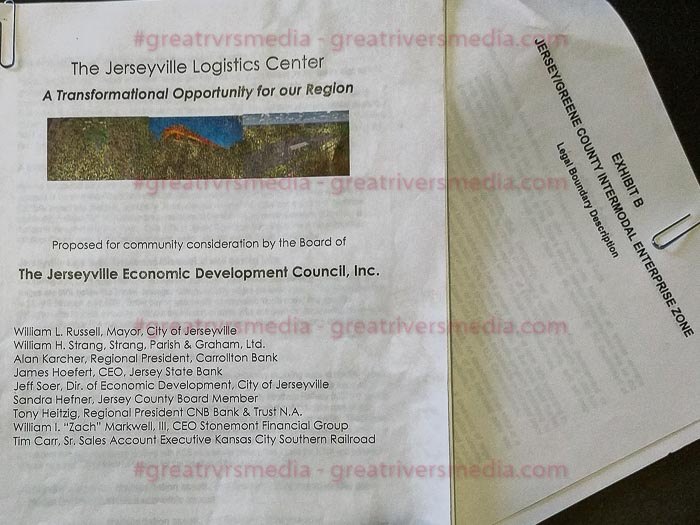Your Ad Could Be Here - For As Little As $25 Weekly! - Call 618-494-2068
"Renting A Slum", How Jerseyville's Enterprise Zone Was Able to Win
JERSEYVILLE - As Jerseyville's press release announcement that their application to create an Illinois Enterprise Zone was successful, solicitations to induce business contributions to their proposed strategic five year plan commenced. Inducement to participate uses economic projections and estimates that show the zone creating 200 local jobs per year for five years and offers "Advisory Council" status to those that "are willing to financially invest in the strategic plan to assure that it reaches its goals." What has been uncovered after months of investigation and interviews may be seen by some as unattainable assumptions, glaring conflicts of interest, "pay for play", possible fraud and disregard of reasonable standards of transparency in government.
Although the Jerseyville Economic Development Council (JEDC) takes credit for creating an Enterprise Zone through the Illinois Department of Commerce and Economic Opportunity (DCEO), material prepared by JEDC states that it has been a 36-month-long process and JEDC has only been in existence since 2016. The new Enterprise Zone was awarded using a competitive scoring system, and is now known as the Jersey-Greene Intermodal Enterprise Zone. The Jersey-Greene Intermodal entity is a completely separate economic development tool and is not related to Jerseyville's previously existing and proposed Tax Increment Financing (TIF) zones.
"No one is going to talk to you" , said Jerseyville city attorney William "Bill" Strang during a telephone conversation that took place a few weeks ago. The call was generated because no hard information was being offered or produced about Jerseyville's proposed economic development and corporate relationships despite repeated attempts to obtain it. Strang's comments during the call also included, "You think you know things but you don't know anything" and "I don't have to give you information because the information is not subject to FOIA" (Freedom of Information Act). Strang certainly should have known, given the nature of the questions be asked of him, that substantial information had already been disclosed by people that had questioned the motives of Strang and/or the people he was representing. Numerous people had already provided important documents with the statement, "You didn't get this from me".
The phone conversation with Strang was the result of many attempts to ask questions of people intimately and directly associated with the Jerseyville Economic Development Council, Inc. (JEDC).
Attorney Strang did eventually disclose a very important piece of information. When asked repeatedly who prepared the documents that were handed off to local municipalities in order to show their interest and participation in the proposed Enterprise Zone, his initial reply was, "Why do you need to know that?". After several minutes of asking the same question he finally admitted that he prepared the documents distributed to the various municipalities that were needed for inclusion into the enterprise zone application. These documents didn't contain important information as required by Illinois statute when applying for and creating an enterprise zone. The omissions in the documents include the map of the proposed enterprise zone and written property descriptions. Besides being the Jerseyville city attorney, Strang is also a board member of the Jerseyville Economic Development Council.
The omission of the map and written property description seemed to be a recurring theme throughout the solicited municipalities. Numerous copies were reviewed and most did not have the material attached. When people representing the interests of the enterprise zone were questioned about the missing parts, the local government board members were told that they would provide the information to them later. Oral representations of the general boundaries were used to obtain signed ordinances and agreements that were needed to submit the enterprise zone application. The Jersey County Board minutes reflect this with two people asking about the missing parts of the paperwork and voting no with the rest of the board passing the measure.
Economic development zones in Illinois are granted based on state statutes administered by the Illinois Department of Commerce. The program was originally designed to stimulate economic growth and neighborhood revitalization in economically depressed areas. Businesses located or expanding in an Illinois enterprise zone may be eligible for state and local tax incentives. Exemptions are available for companies that make minimum investments that either create or retain a certain number of jobs. When the Department of Commerce was contacted for comment regarding the local enterprise zone application and the missing required pages, the attorney for the department and another person in the room with him talking via speakerphone, decided after being asked questions that they were not comfortable providing answers about ways to intervene if fraud occurred and then ended the call. Before the call ended, it was clear that the department has no mechanism currently in place to verify important information the enterprise zone applications contain. The department representatives made it clear that "local hearings" was the answer of choice with regard to information verification despite being provided specific examples of how a hearing could not stop incorrect or manufactured data from inflating scores of entities competing for enterprise zones or obtaining signatures by misrepresentation.




Thousands of acres of land in Madison and Jersey County that would normally not qualify for an enterprise zone on their own merit were able to do so only by including areas that extend to Roodhouse in order to show poverty, free school lunch and unemployment numbers that would increase the competitive score of the proposed zone when judged against competitors. As Jerseyville has carved out the bulk of the awarded zone; Brighton, Carrollton, White Hall and Roodhouse see no immediate reward in return in employment for the use of their demographic information. Currently there is no 24 hour public transportation system that will provide rides to and from jobs and services for the very people that were used to obtain a high score in the application process. Unless you reside in the immediate vicinity of the Jerseyville centered development or have reliable transportation, the zone offers little economic opportunity with respect to getting a well paying primary or spinoff job.
-page-001.jpg)
Shari Albrecht, the recently appointed Zone Administrator of the Jersey-Greene Intermodal Enterprise Zone, has also refused to provide information related to the enterprise zone and states that Mayor Russell is the person that is to answer all enterprise zone questions. Jerseyville Mayor William "Billy" Russell, when contacted and asked questions about the enterprise zone, said he would talk to Bill Strang and provide the information requested. He never did.
Albrecht was originally hired by the Jersey County Business Association (JCBA) in 2016 as interim CEO of the organization and was ultimately named the permanent CEO later that year. At some point , according to current JCBA Chair Tom Smith, Albrecht moved into a Jerseyville City Hall office and worked full time on the proposed enterprise zone on behalf of the City of Jerseyville's Economic Development Council despite being on the payroll of JCBA/Jersey County Economic Development, Inc. (JCED).
During a recent conversation with Nathan Wittman, the JCBA Chairman at the time of Albrecht's hiring, he now says he has no recollection of conversations or events that resulted in her working on Jerseyville's behalf. Tom Smith, the current JCBA Chair, said in a recent interview that Albrecht was as of 2018 being paid by entirely by Jerseyville. When asked how she was working for Jerseyville but being paid by the Jersey County economic development entity, he said that they (JCBA and JEDC) were working closely together. When asked if Jersey County Economic Development had received any consideration, such as a seat on the board of the Jerseyville Economic Development Council in return for the use of Albrecht, Smith said that they had not and he knew very little about the Enterprise Zone but was wanting to see what was going to be announced.
Two entities now exist in the region with regard to economic development. The original and oldest Jersey county economic development entity is the Jersey County Economic Development Corporation that was registered in March, 1997. The local business association head, Beth Bear is now listed as the registered agent. Previous tax filings for the Jersey County corporation show Mary Heitzig as the Executive Director for the years 2015 and 2016 with Alan Gilmore preceding her. Shari Albrecht is not listed in the 2016 filing even though an August 2016 press release states she has been the interim Director of the JCBA and was as of then the official part time Director.
The Jerseyville Economic Development Council, Inc. was registered In January of 2016 and lists William Strang as the registered agent. Attorney Strang said that he would provide the publicly available tax filing as required by law of The Jerseyville Economic Development Council but has yet to produce the documents. A call to the firm that is supposed to be producing the documents according to Strang, Scheffel and Company, was never returned. The tax documents they are obligated to provide by law show the corporate income and expenses as well as compensation of certain employees.
Documents obtained from interested parties list Mayor Russell, Attorney Strang, Alan Karcher, James Hoefert, Jeff Soer, Sandra Hefner, Tony Heitzig, Zach Markwell (Stonemont Financial) and Tim Carr (Kansas City Southern) as being on the Jerseyville Economic Development Council board. Neither Markwell or Carr are local residents and work for entities that can place them in a conflict of interest position as members of the not for profit Council.
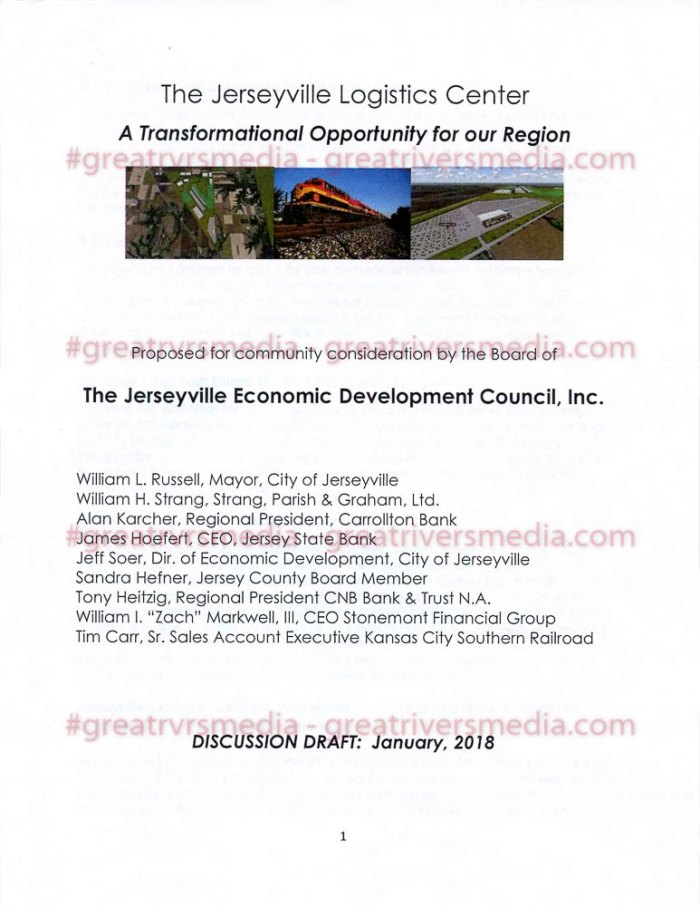
One document soliciting funds regarding the Jerseyville KCS Logistics Center states, "In addition to the initial "chartering board," there will be an Advisory Council made up of those with a strong stake in the economic prosperity of the Jerseyville and Jersey/Greene County region, and are willing to financially invest in the strategic plan to insure it reaches its goals." This document uses estimates of employment and economic impact as a reason to become involved.
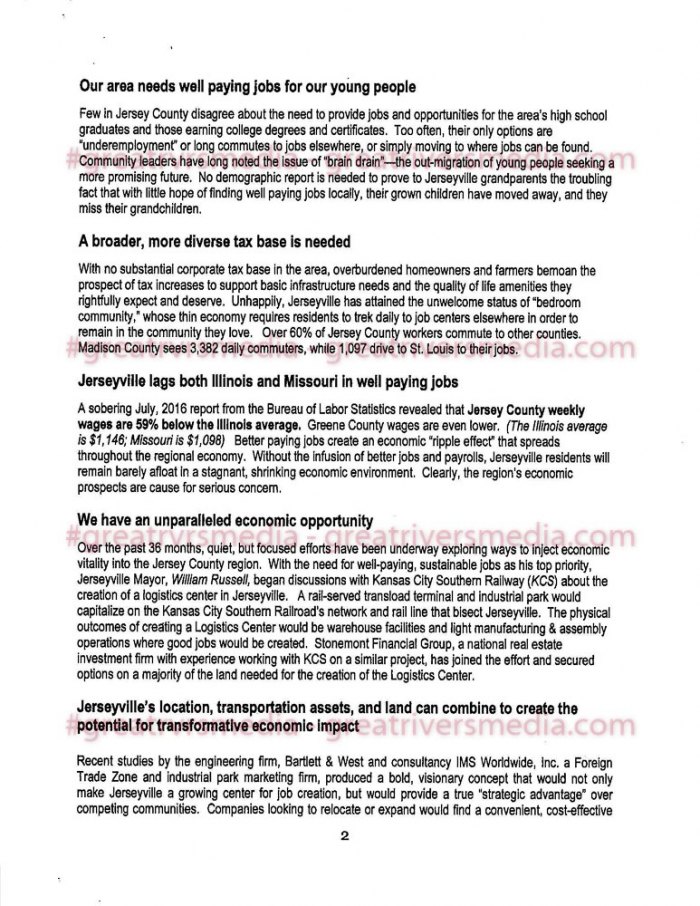
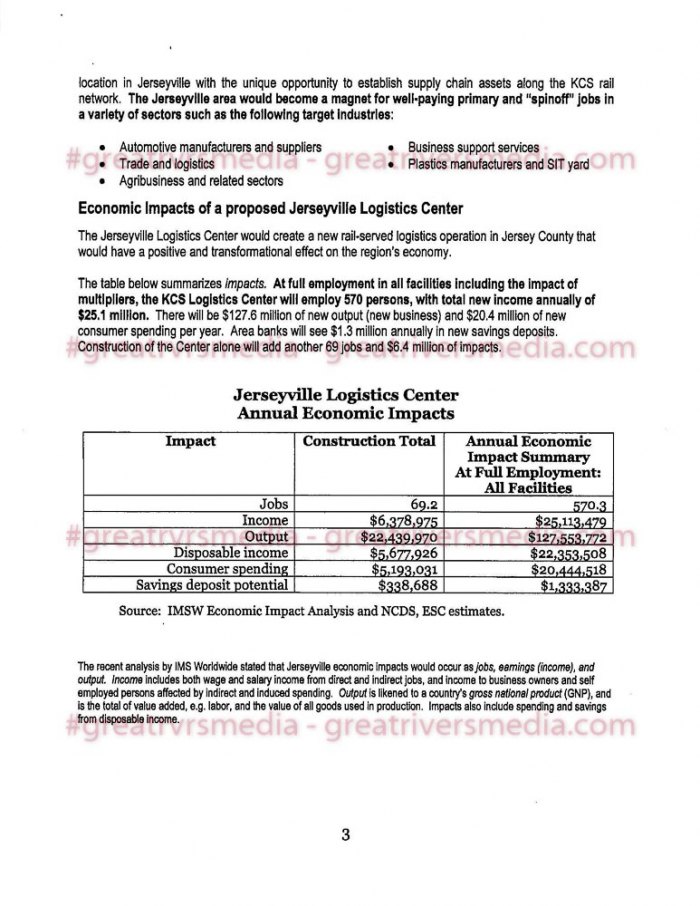
In a phone conversation this week, a person involved with generating the enterprise zone projections being used said it had been a year and a half since they had last been in Jerseyville. The person stated they had not been asked to contribute to the document with updates. He said, "There's a lot of water under the bridge since we wrote that. .. I'm not comfortable with them using that as today's gospel". They explained the the subscription based IMPLAN software and data used to create the reports generated and used for the enterprise zone application. "We were looking at a greenfield, a Jerseyville project two years ago we did this report. It was essentially a greenfield, there was nothing there. So we took some very smart people's estimates of what could occur. I believe we cast them in a high or medium or low impact. We based assumptions on construction, about the physical work and then the occupation of the buildings. Whether they were freight forwarders, or transloaders or other people who would be providing logistics activity."
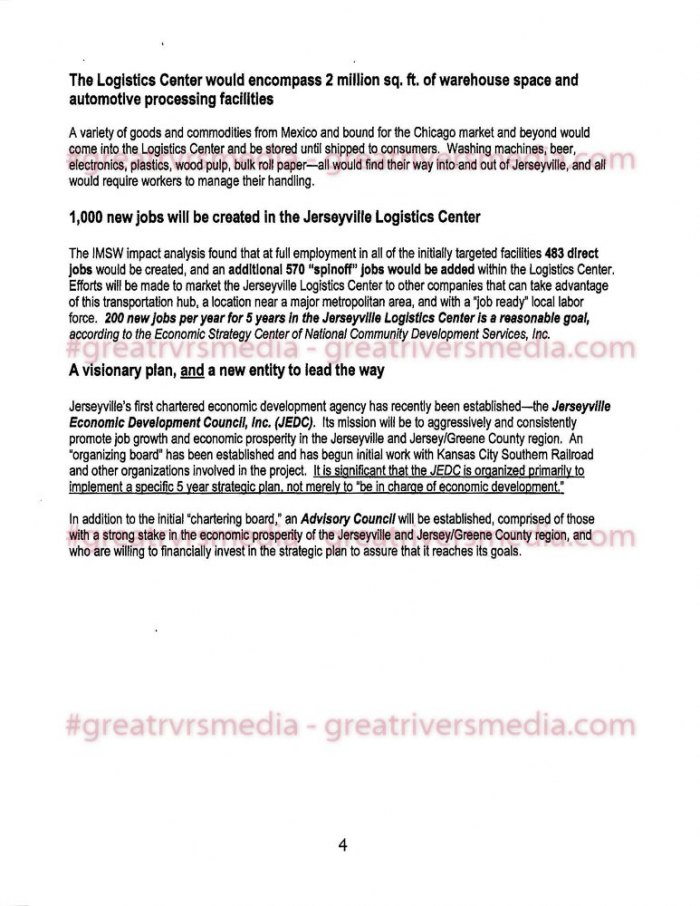
He went on to say, "One of the challenges we had in Jerseyville, as I recall, there are no 100,000-square-foot logistics centers to use as the baseline for a reasonable multiplier. So we made some assumptions again." When asked about how technology and automation might change assumptions that have been made in the past, he continued with, "When you look at high volume e-commerce warehouses you have a completely different structure for basing that assumption on. Rather than a rather rudimentary, I don't demean the worker that is there, but transloading from a railcar to a truck is a lot more labor intensive than a pick off a key hook robot. I don't know that IMPLAN has made adjustments to the degree of detail that would register a highly automated warehouse and its impact from a less automated warehouse. I don't know that anybody in the world is that sophisticated yet."
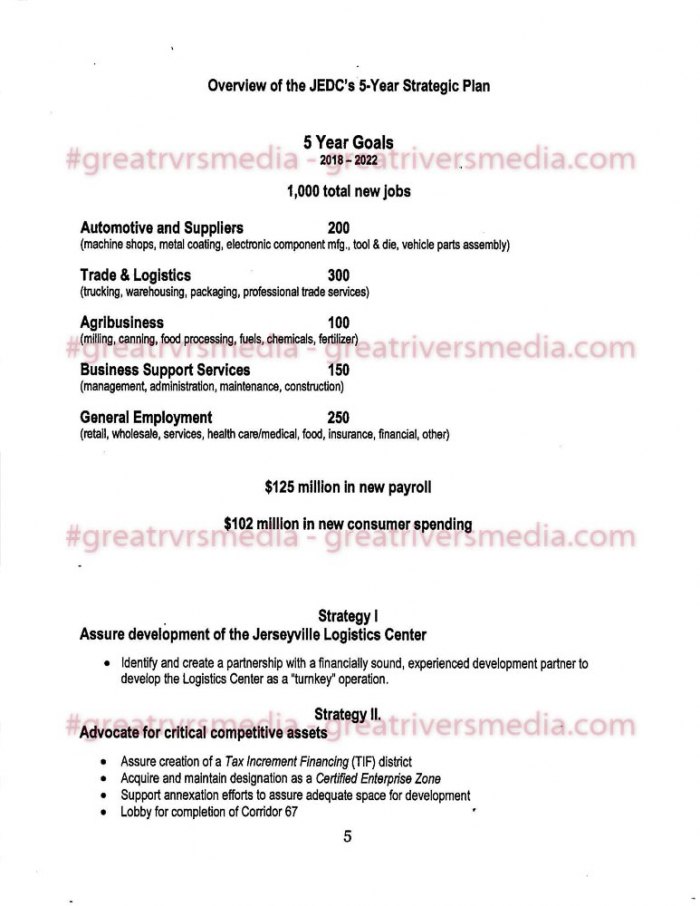
"The numbers were based on some very broad assumptions, based on our experience in how industrial parks grow and how they evolve. You can be way wrong or way right very easily depending on who decides they need the rail service and the growth can occur much faster than expected. If you have the right mix of users and you have the right marketing. So they are what they are."
There was also discussion of how the political considerations of trade with Mexico may have impact on the assumptions made and used. The document suggests that warehousing and logistics jobs will create significant boosts to the local economy. According to the online job marketplace Indeed, the average warehouse job in the St. Louis region averages $11.01 per hour. With technology becoming less expensive to implement, many of these jobs will be completely automated in the near future and significantly less employees will likely be needed. Transportation may very well utilize automated, self driving trucks that don't require a driver. The disruptive technology that automation and robotics bring to logistics and manufacturing parks may significantly change the assumptions being made using traditional models, ideas and methods of economic impact.
One of the zone board members is an employee of Kansas City Southern. KCS owns the rail line that runs from Mexico and continues through the length of the new enterprise zone with the exception of the Union Pacific track running through Brighton. While the project is designed to rely on Kansas City Southern rail and provides KCS a terminal that allows convenient access to markets at the northern end of their line, a document created by the Enterprise Zone was discovered that listed Kansas City Southern on the last line of a page that contained anticipated investment and job creation. Kansas City Southern had no expected investment or direct job creation listed on that page. The compiled information appeared to be solicited with the help of a letter template that shows what to include and advises whoever uses it to not allow the document to be part of any Freedom of Information requests.
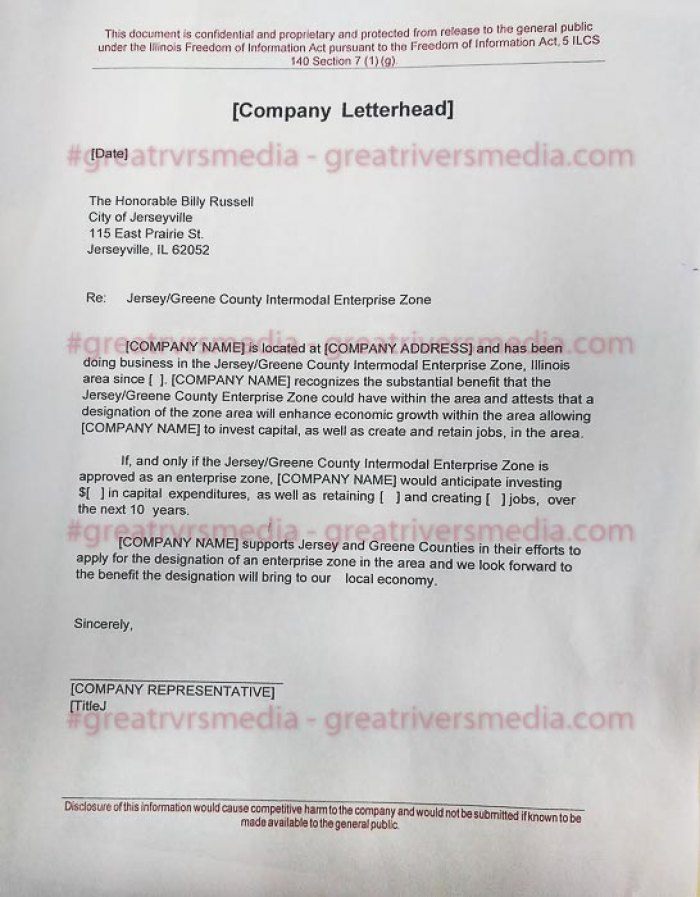
I reached out to professor Colin Gordon initially to discuss the proposed Jerseyville TIF district. Gordon has an interest in public policy. He is a senior research consultant at the Iowa Policy Project and author of Mapping Decline: St Louis and the fate of the American City. Mapping Decline traces the transformation of metropolitan St. Louis in the 20th century, focusing on local regulation of land use, including restrictive deed covenants, real estate restrictions, and municipal zoning. We discussed the enterprise zone as well as the TIF. He weighed in on the enterprise zone by saying that Kansas City Southern needs to be situated near here. It's in their best interest to be here and that it's unwise to give concessions as it's in their interest to be here.
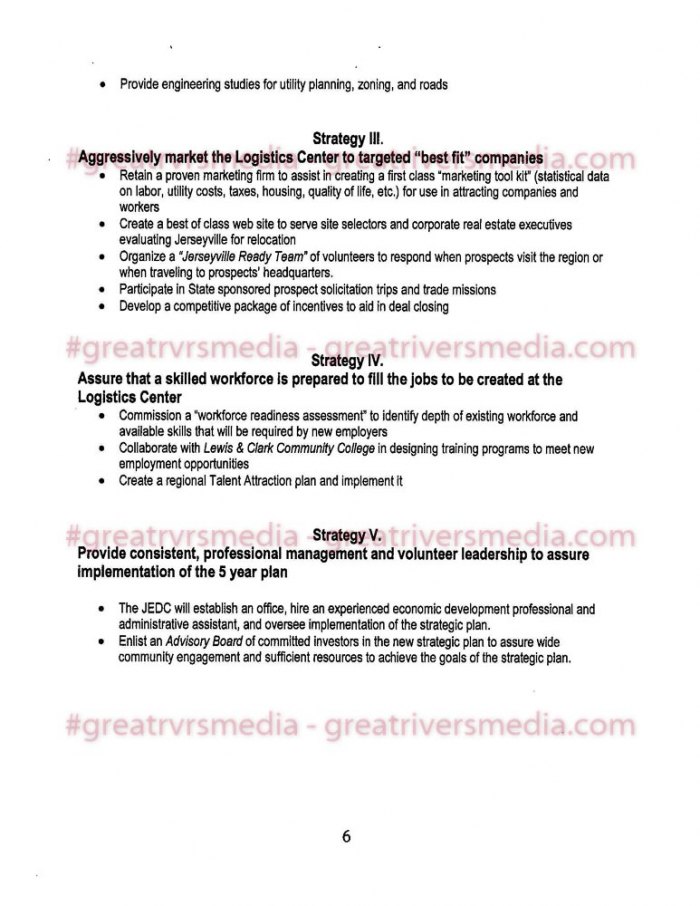



Another appointed board seat is held by the principal of Stonemont Financial. Stonemont is a private real estate investment firm headquartered in Atlanta, GA. and their online presence states that "Stonemont seeks out attractive investment opportunities in the net lease, sale-leaseback and build-to-suit real estate markets".
When Greg LeRoy of Washington D.C. based Good Jobs First was asked about his thoughts about what is being done locally with regard to the enterprise zone and TIF districts, he replied with "In the economic development profession, this is known as "renting a slum." It's an example of how two incentives, enterprise zones and tax increment financing districts, that were created with good intentions to revitalize depressed areas, have over time become deregulated so that they can be gamed."

